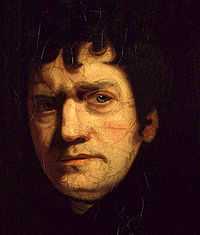John Wolcot
| John Wolcot | |
|---|---|
|
Portrait of John Wolcot by John Opie, circa 1780 (detail) | |
| Born |
9 May 1738 Dodbrooke, near Kingsbridge, Devon |
| Died |
14 January 1819 (aged 80) Somers Town, London |
Resting place | St Paul's, Covent Garden |
| Nationality | British |
| Other names | Peter Pindar |
| Alma mater | Aberdeen University |
| Occupation | Physician, Clergyman, Author |
John Wolcot (9 May 1738 – 14 January 1819) was an English satirist, who wrote under the pseudonym of "Peter Pindar".
Life
Wolcot was born in Dodbrooke, near Kingsbridge, Devon. He was educated by an uncle, and received his M.D. from Aberdeen University. In 1767 he went as physician to Sir William Trelawny, Governor of Jamaica, whom he persuaded to present him to a church in the island then vacant. He was ordained in 1769. Sir William died in 1772; Wolcot came home and, abandoning the Church, resumed his medical career. He settled in practice at Truro, where he discovered the talents of John Opie, and assisted him.
In 1780 Wolcot went to London and began writing satires. The first objects of his attentions were the members of the Royal Academy. These attempts being well received, he soon began to fly at higher game, the King and Queen being the most frequent marks for his satirical shafts. In 1786 he published The Lousiad, a Heroi-Comic Poem, which took its name from a legend that a louse had once appeared on the King's dinner plate.
Other objects of his attack were Boswell, the biographer of Samuel Johnson, James Bruce, the Abyssinian traveller, Hannah More, former bluestocking and playwright, and Bishop Porteus. Wolcot had a remarkable vein of humour and wit, which, while intensely comic to persons not involved, stung its subjects to the quick. He had likewise strong intelligence, and a power of coining effective phrases. In other kinds of composition, as in some ballads which he wrote, an unexpected touch of gentleness and even tenderness appears. Among these are The Beggar Man and Lord Gregory. Much that he wrote has now lost all interest owing to the circumstances referred to being forgotten, but enough still retains its peculiar relish to account for his contemporary reputation.
He died at his home in Latham Place (now part of Churchway), Somers Town, London on 14 January 1819, and was buried in a vault in the churchyard of St Paul's, Covent Garden.
See also
- Pindar, the ancient Greek poet
References
| Wikisource has original text related to this article: |
| Wikiquote has quotations related to: John Wolcot |
 This article incorporates text from a publication now in the public domain: Cousin, John William (1910). A Short Biographical Dictionary of English Literature. London: J. M. Dent & Sons. Wikisource
This article incorporates text from a publication now in the public domain: Cousin, John William (1910). A Short Biographical Dictionary of English Literature. London: J. M. Dent & Sons. Wikisource- Portrait of John Wolcot by John Opie, R.A.
|
